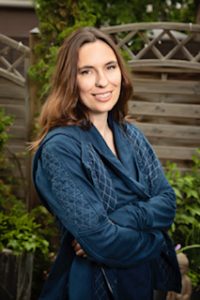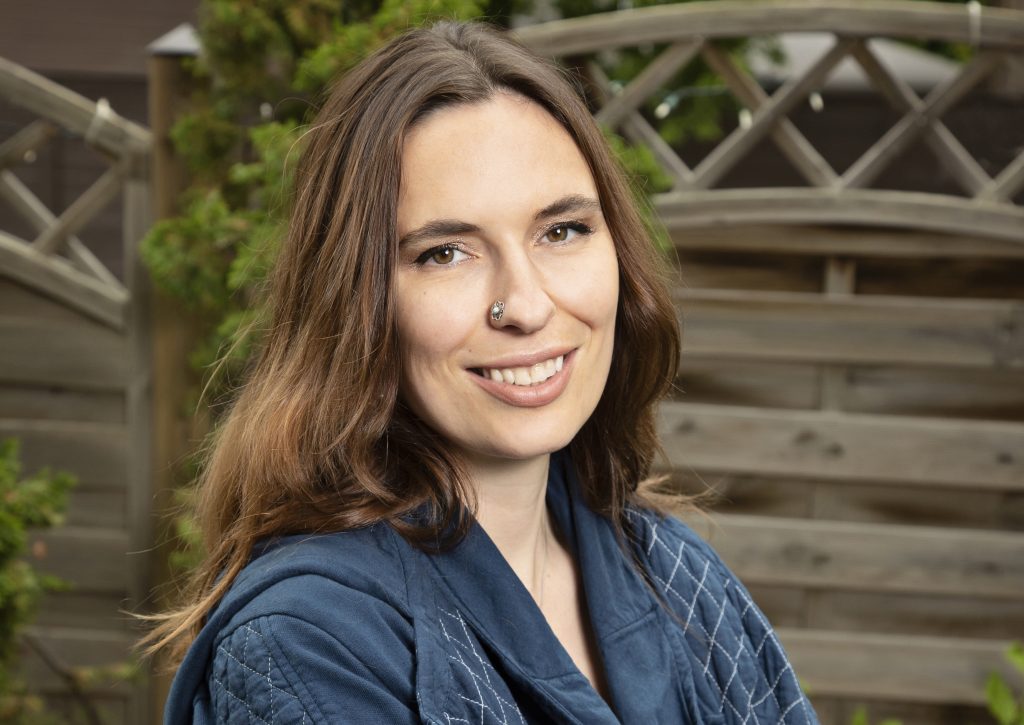
Willow Iorga (MEd’22) was recently awarded one of two Spring 2022 Associate Dean’s Graduate Student Thesis Awards. Willow is currently an Employment Instructor (just promoted to Team Lead of Work Experience and Employer Relations) with the Open Door Society, where she teaches newcomers Canadian workplace skills. She has a BA in geography and an after degree in elementary teacher education, both from the University of Regina. Willow’s award-winning thesis is entitled, “The Immigrant Mother’s Experience of Their Children’s Heritage Language Loss.” What follows is Willow’s research story:
Willow grew up on Pender Island, BC, located off the west coast of Canada, on a 3-acre organic farm/garden. When she was 11, her parents introduced her to world travel, selling their Pender Island property and traveling to Hawaii, New Zealand, Fiji, Japan and Australia. “We backpacked and camped a lot,” says Willow, “Sometimes I liked traveling, but a lot of times I missed my friends back in Canada.” In Australia, Willow experienced a foreign school system. “It was really different, we had to wear uniforms, it was a lot more strict, they taught Japanese instead of French as a second language, and I was really behind in math,” she says.
It wasn’t so much these younger childhood experiences, however, that have given her insights into what it feels like to be a newcomer, informing her current work and research with newcomers. Willow points to living in Quebec in her late 20s as an experience that really helped her feel what it is like not to speak the language of the context in which one lives. “We were living outside of Montreal and no one spoke English and I was in language classes .… In my French classes, I couldn’t understand anything, unless they translated into English, I was just so lost all the time in that class. I know how confused and lonely that period in Quebec was.”
What led Willow to her research topic, immigrant mothers’ experiences of their children’s heritage language loss, was an experience teaching at the Regina Immigrant Women’s Centre, where the majority of her students were Syrian refugee mothers. Willow says, “They would come to class part time, all were homemakers, responsible for taking care of the children and cooking. They had virtually no time to do homework or practice outside of the class. It was a real struggle to make any progress. When we would chat we would use Google translate to communicate, so we could have real conversations. A lot of them would tell me that their kids were starting to forget Arabic. The kids were put into the school system, into ESL classes, and they were forgetting how to speak Arabic. I wondered, ‘How on earth can they have children that don’t speak the same language?’ cause they can’t communicate in English at all, how can they communicate with their kids? That’s why I chose this topic.”
Due to ethical considerations, Willow did not conduct her research with these particular mothers, but she had relationships with newcomer co-workers and peers who participated in her research. Willow’s findings include the following:
- Language is fluid. It can be learned and lost at any age, by any family member, depending on their environment and whether one is using their language or not.
- English quickly becomes the dominant language for newcomer children no matter how much reinforcement they receive at home.
- Even if kids share a language, they will convert to English rather than their home language.
- Online resources are important resources that parents can utilize in maintaining their children’s language. “For example, when I asked what mothers did to maintain their child’s language, they all used YouTube channels that they had their kids watch,” says Willow.
- A lack of shared cultural framework can create a divide between mother and child.
What impressed Willow during her research is a story that a Chinese-speaking participant told her: “Her daughter was in Grade 4 or 5, and a new student who came from China joined their classroom. The teacher sat two Chinese Canadian girls next to the newcomer, to help the new student. But the girls couldn’t understand the newcomer. Even though they all spoke Chinese and understood the words, the context didn’t make sense,” says Willow. This story showed Willow how “language evolves and it is really dependent on context and culture. It’s not just the words.”
The recommendations coming out of Willow’s study target schools and administrators, settlement agencies, and the Government:
- Schools and school administrators should move toward more inclusive linguistic policies in the classroom.
- Settlement agencies should move toward more inclusive linguistic policies.
- Governments should allocate greater resources towards language heritage centres and education.
Willow explains her use of “inclusive linguistic policies” saying, “In my research I found that as a teacher you don’t have to know, speak, or include the child’s language in the classroom. Your attitude alone toward that language can determine whether the student retains it or not. A lot of classrooms and workplaces have English-only rules.”
When asked what she hopes will be the outcome of her research, Willow responded, “For a lot of teachers to change the way they approach language; there are a lot of misconceptions, such as children need to know English to be successful and English needs to be dominant. If you have two or more languages, it is better for your brain development.”
As for future plans, at this point, Willow doesn’t plan to pursue a PhD. For the past four years, she has been a busy mom, full-time instructor at the Open Door Society, part-time teacher at the YWCA, and a master’s student, as well as while a student working as a teaching assistant or research assistant; she is now looking forward to some rest and a slower pace. That decision may or may not sit well with her dad, Dr. Patrick Lewis, a professor of early childhood education at the University of Regina, who was a major influence in her decision to pursue a career in the field of education (and also influenced her to take a thesis-route master’s program). Willow says, “When I was little, I would go to school with my dad who was a teacher, and then I would have to wait after school until he was done his prep work at the end of the day. I was always in his classroom. And when I had to do co-op hours for the career and personal planning program in high school, I always did those in my dad’s classroom.” Another influence was her teaching assistant work with Dr. Fatima Pirbhai-Illich, a professor of language and literacy education at the University of Regina. Willow says, “While I was a geography student, I was a teaching assistant for about 3 years and Fatima had a SSHRC grant and we were doing a pretty big project at Cornwall Alternative School. I was in the classroom a lot with the kids.”
After her geography degree, Willow earned a 2-year elementary education after degree. What Willow enjoyed about her after degree program in education was the internship and field experiences because, she says, “Instead of doing a degree with an idea in your head about the career, you get to be in that environment and decide if you actually want to be in that environment. I was in a Grade 2 class for my internship, and I really didn’t like it. I love kids but I don’t love trying to get them to do math, or be quiet at assemblies, or not hit each other on the playground.” When she graduated, Willow did not chose to apply to teach in a K-12 school system. She says, “You can do so many things with an education degree. There are so many possibilities; you don’t have to be in the K-12 system. I applied to settlement agencies to teach English with adults. When I started teaching I was assigned students who had really low English levels, the majority were refugee women from Syria or Sudan … I did have literacy skills from the elementary program but adult brains are pretty different. So I ended up going back to do my master’s.”
What makes education significant enough to choose a life career in it? Willow says, “I enjoy it. It’s that simple. You have to work your whole life and you have to spend your time doing something, and teaching is something that, no matter what, it’s always enjoyable, always different. I can always change things, and renew things. You have so much creative control. If I’m bored of something, I can change what we’re doing this week.”
Follow us on social media
